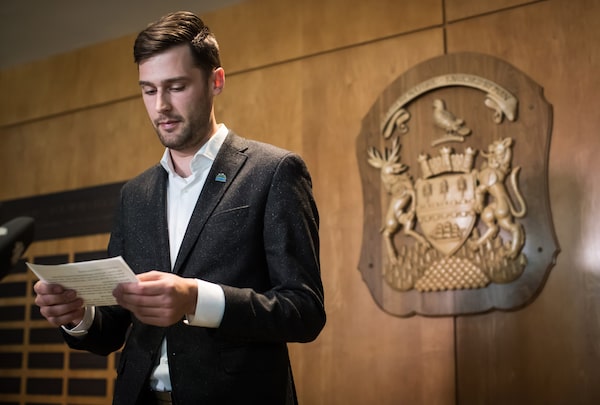
Mr. Vagramov was thinking about himself, not his city, when he returned to work.DARRYL DYCK/The Canadian Press
Adrienne is a Vancouver journalist who writes about civic affairs
Port Moody Mayor Rob Vagramov chaired a surreal council meeting last week where residents stood before him to share their views about whether he should stay on leave until a charge of sexual assault against him concludes. Watching Mr. Vagramov welcome people to the microphone to weigh in on his own political future felt a bit similar to watching a judge accused of a crime run his own trial. And the obvious conflict that arose when he voted against a motion made by Councillor Diana Dilworth urging him to book off until the case is over drove home the point that rules are needed to help municipalities navigate these messy situations.
Mr. Vagramov, who maintains his innocence, took a five-month leave of absence when the charge was laid. But he returned in September, stating his defence preparations no longer require his full attention and he had enough time to resume his mayoral duties. He also stated the “scary indictment” had been reduced to a summary matter that might settle without going to trial. But by this week, Mr. Vagramov bowed to the pressure and announced he would step off the job once again until his name was cleared. “From what I can tell, some people out there won’t be happy until they see my head on a stake,” he told council, reading from a prepared statement. He further stated he expects to return to regular duties once his case concludes in three or four weeks.
There is currently no legislative mechanism to remove a municipal mayor or councillor charged with a serious criminal offence from office. The Union of B.C. Municipalities in 2018 asked the province to pass a law requiring an elected local government official charged with a serious criminal offence to go off on leave until the case concludes and be disqualified from office if convicted. The motion was introduced by Pitt Meadows council, which was reeling after one of its councillors that spring was convicted of sexually assaulting a 14-year-old girl and sentenced to nine months in jail. Council couldn’t force David Murray to resign and he hung onto his council position until four days after his sentencing. The provincial government is currently considering the request.
It must have been difficult for Mr. Vagramov to keep his cool at the Oct. 8 meeting while being accused of besmirching council’s reputation and derailing the regular order of business. But that was the effect of his early return, regardless of his guilt or innocence. Routine agenda items were overshadowed by emotional responses from Port Moody residents weighing in on his fitness to govern. Some argued the principle of innocent until proven otherwise was paramount and he should be allowed to stay unless convicted. Others advanced a greater-good argument and stated he should step aside until the case concludes both as a show of respect for women and to protect council’s reputation.
Sadly, the battle over Mr. Vagramov’s early return also cleaved Port Moody’s city council into two camps along gender lines. The four women, who form a majority on council, all voted in favour of the motion asking him to stay out on leave. The three men, including Mr. Vagramov, voted against. It will be hard for this #MeToo battle not to have a lingering effect on their interpersonal relationships going forward.
As much as it might seem unfair to force someone who has not yet been tried and convicted to step away from their job, the Port Moody example shows the damage of allowing them to stay is even greater. Mr. Vagramov was thinking about himself, not his city, when he returned to work. And politicians, to live up to their oaths of office, promise to place the interests of their communities ahead of their own. Mr. Vagramov, it appears, was prodded – kicking and screaming – into doing the right thing. But it shouldn’t have had to come to that. Somewhere in British Columbia, this type of situation will arise again, and when it does, it would be good if there was a law in place making it mandatory for a municipal politician to take a leave if charged with a serious criminal offence and resign if convicted.
We have a weekly Western Canada newsletter written by our B.C. and Alberta bureau chiefs, providing a comprehensive package of the news you need to know about the region and its place in the issues facing Canada. Sign up today.